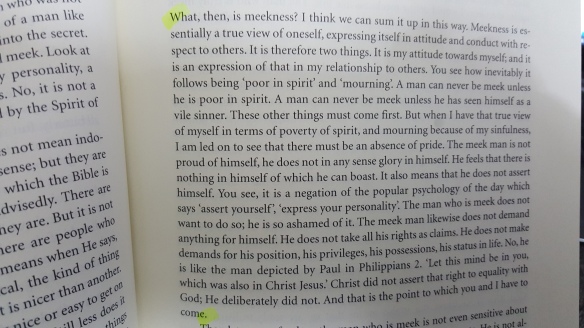 I’ve recommended Studies in the Sermon on the Mount by Martyn Lloyd-Jones here, here, and here. As I read through again I’m reminded of the wonderful edifying benefits of Lloyd-Jones’ work. If you have not read this commentary, once again, I highly recommend. Below are some highlights from the chapter Blessed Are the Peacemakers. The entire chapter is a gentle reproof that peace and contentment are not found in self. Peace and contentment are not found in surrounding ourselves with others who only serve to affirm our feelings. Our hearts are deceitful and as a result our feelings can be irrelevant to truth (Jeremiah 17:9). Peace and contentment can’t be manufactured or created by the world and/or it’s foolish philosophies (Romans 3:16-18, Colossians 2:8) . Peace and contentment are gifts (John 14:27). Gifts, like faith and repentance (Ephesians 2:8, Acts 11:18), that are only given by God Himself. As we are conformed into the image of Christ and our minds are renewed (Romans 12:2) we are led to deny ourselves (Matthew 16:24). As we continue to pray for Him to graciously create in us a new heart (Psalm 51:10), providentially increase our faith (Romans 12:3), and mercifully allow us to grow in the grace and knowledge of our Savior Jesus Christ (2 Peter 3:18), our desires will begin to harmonize with His. Our desires will not be occupied with self but rather we’ll be satisfied in loving God (1 John 4:19) and serving others (1 Peter 4:10).
I’ve recommended Studies in the Sermon on the Mount by Martyn Lloyd-Jones here, here, and here. As I read through again I’m reminded of the wonderful edifying benefits of Lloyd-Jones’ work. If you have not read this commentary, once again, I highly recommend. Below are some highlights from the chapter Blessed Are the Peacemakers. The entire chapter is a gentle reproof that peace and contentment are not found in self. Peace and contentment are not found in surrounding ourselves with others who only serve to affirm our feelings. Our hearts are deceitful and as a result our feelings can be irrelevant to truth (Jeremiah 17:9). Peace and contentment can’t be manufactured or created by the world and/or it’s foolish philosophies (Romans 3:16-18, Colossians 2:8) . Peace and contentment are gifts (John 14:27). Gifts, like faith and repentance (Ephesians 2:8, Acts 11:18), that are only given by God Himself. As we are conformed into the image of Christ and our minds are renewed (Romans 12:2) we are led to deny ourselves (Matthew 16:24). As we continue to pray for Him to graciously create in us a new heart (Psalm 51:10), providentially increase our faith (Romans 12:3), and mercifully allow us to grow in the grace and knowledge of our Savior Jesus Christ (2 Peter 3:18), our desires will begin to harmonize with His. Our desires will not be occupied with self but rather we’ll be satisfied in loving God (1 John 4:19) and serving others (1 Peter 4:10).
The peacemaker is one who is not always looking at everything in terms of the effect it has upon himself. Now is not that the whole trouble with us by nature? We look at everything as it effects us. “What is the reaction upon me? What is this going to mean to me?” And the moment we think like that there is of necessity war, because everybody else is doing the same thing (pg. 105).
We must say about the peacemaker is that he has an entirely new view of himself, a new view which really amounts to this. He has seen himself and has come to see that in a sense this miserable, wretched self is not worth bothering about at all. It is so wretched; it has no rights or privileges; it does not deserve anything. If you have seen yourself as poor in spirit, if you have mourned because of the blackness of your heart, if you have truly seen yourself and have hungered and thirsted after righteousness, you will not stand any longer on your rights and privileges, you will not be asking, “What about me in this?” You will have forgotten this self (pg. 105).
The peacemaker has only one concern, and it is the glory of God amongst men. That was the Lord Jesus Christ’s only concern. His one interest in life was not Himself (pg. 106).
I often remind my family during devotions that the Word became flesh, allowed Himself to be judged by a people who had no right, in order to redeem a people He didn’t even need to create. This is a love that has no interest in self. And it’s in this finished work where true peace and contentment are to be found.


 Therefore we are commanded to search the Scriptures as for silver [John 5:39], and to seek in them as for treasures, to read in them continually, to meditate on them day and night [Ps. 1:2], to use them as bracelets upon our arms, and frontlets between our eyes [Deut. 6:8], to teach them to our posterity, and to talk of them when we are in our houses, and when we walk by the way, when we lie down, and when we are up. And great reason there is of this commandment, seeing that (as an ancient writer says)
Therefore we are commanded to search the Scriptures as for silver [John 5:39], and to seek in them as for treasures, to read in them continually, to meditate on them day and night [Ps. 1:2], to use them as bracelets upon our arms, and frontlets between our eyes [Deut. 6:8], to teach them to our posterity, and to talk of them when we are in our houses, and when we walk by the way, when we lie down, and when we are up. And great reason there is of this commandment, seeing that (as an ancient writer says)